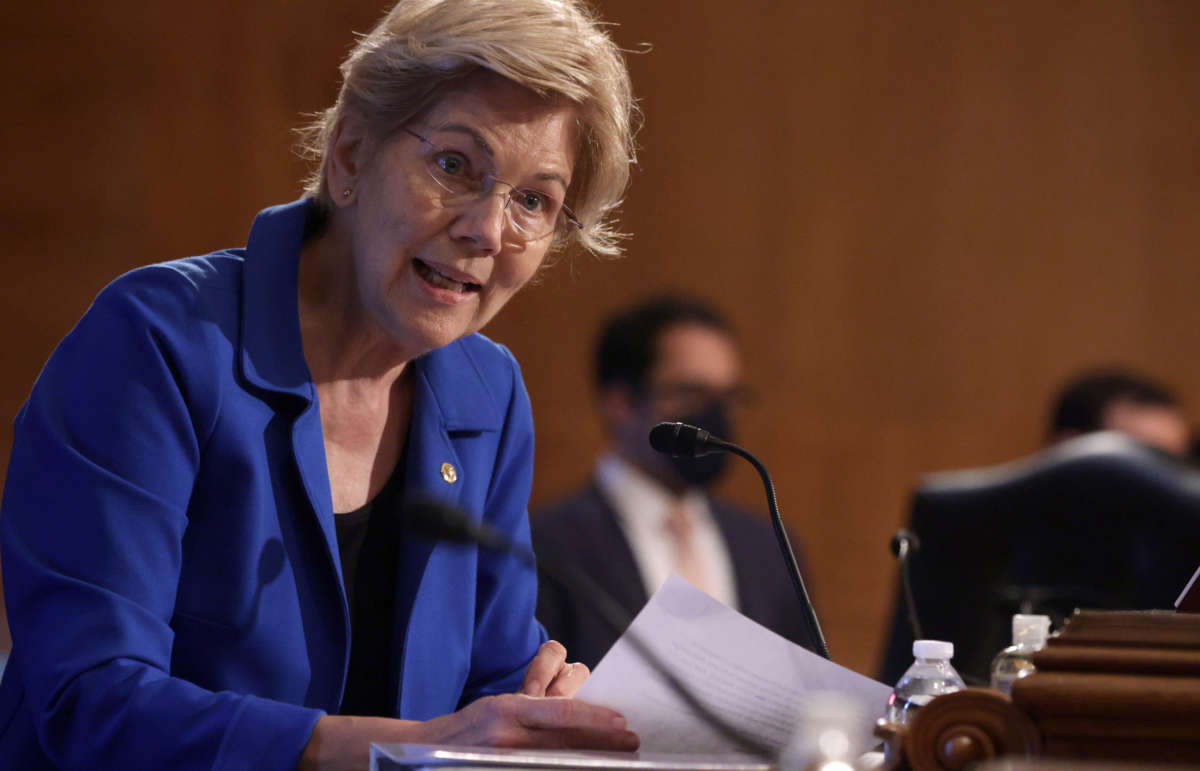Honest, paywall-free news is rare. Please support our boldly independent journalism with a donation of any size.
Sen. Elizabeth Warren (D-Massachusetts) recently sent a letter to Jerome Powell demanding more information on stock trades by Federal Reserve Vice Chair Richard Clarida after a New York Times report revealed that Clarida failed to disclose the extent of his trades just before the stock market crashed in 2020.
Last year, Clarida reported moving between $1 million and $5 million into an investment fund, buying shares on February 27th, 2020 – the day before Chair Powell made a major announcement about rule changes at the Fed in preparation for the pandemic.
However, Clarida recently amended that financial disclosure to reflect another potentially significant trade he made around the same time. The vice chair sold shares of the investment fund on February 24, just as stocks were plunging. Clarida defended himself when news of the February 27 trade came out, saying that the trade had been planned in advance, but the February 24 sale makes this statement look dubious, The New York Times reported.
Though Clarida is departing the agency, Warren believes that this new information raises concerns about stock trades at the Fed in general. In her letter, she gave Powell a deadline of January 17 to provide all available information about Fed officials’ trades.
“The Fed has failed to respond to two of my previous inquiries,” Warren wrote. “This refusal to provide information to Congress became even more troubling after a report last week in the New York Times revealed that one Fed official’s trades ‘went further than first disclosed,’ raising fresh questions about the actions and intent of Fed Vice Chair Richard Clarida.”
Warren went on to say that she is “deeply concerned” with the Fed’s refusal to be transparent about stock trades, “rais[ing] suspicions that the Fed may be failing to disclose the full scope of the scandal to the public.” She then cited a March 2020 email in which ethics officials warned Fed officials to refrain from trading stocks as the pandemic was rocking the market, for fear of such trades looking suspicious to the public.
The Massachusetts lawmaker has previously requested that the Securities and Exchange Commission (SEC) look into potential insider trading at the Fed. Clarida’s trade is just one of multiple scandals that have emerged from the Fed over past months, including one involving Powell himself, whose confirmation hearing before the Senate Banking Committee is scheduled for Tuesday.
Shortly after news of Clarida’s trades emerged, The American Prospect revealed that Powell sold between $1 million and $5 million in stock just before the stock market crashed in October of 2020 – at the time, the largest drop since the March 2020 crash. Powell had communicated with Treasury Secretary Steve Mnuchin four times on the day of the sale, and days after, encouraged Congress to pass the stimulus package in order to help the economy recover.
At the time, Warren advocated for her legislation to bar top politicians, including financial regulators, from being able to trade stocks. After news of the scandal broke, the Fed did take steps to ban its officials from buying individual securities, but trades like Powell’s are still permitted under the new rules.
In her letter, Warren said that it is crucial not only for the SEC to investigate the agency, but also for the agency to release details of Clarida’s trades, among others, in order for officials to be held accountable by Congress. This demand is especially timely in relation to Powell’s potential confirmation by the Senate, to which Warren is vehemently opposed.
“[T]imely release of this requested information is also critical so that Congress and the public can evaluate the full extent of trading in individual stocks by Fed officials, the extent to which Fed officials were warned of the risks from their trading, and whether the plans you announced to change the Fed’s ethics practices are sufficient to prevent future financial conflicts of interest,” Warren wrote.
The agency’s “continued refusal to release this information severely compounds concerns about the Fed’s lack of transparency and your commitment to fully and honestly addressing the Fed’s broken ethics culture,” she went on.
Press freedom is under attack
As Trump cracks down on political speech, independent media is increasingly necessary.
Truthout produces reporting you won’t see in the mainstream: journalism from the frontlines of global conflict, interviews with grassroots movement leaders, high-quality legal analysis and more.
Our work is possible thanks to reader support. Help Truthout catalyze change and social justice — make a tax-deductible monthly or one-time donation today.
